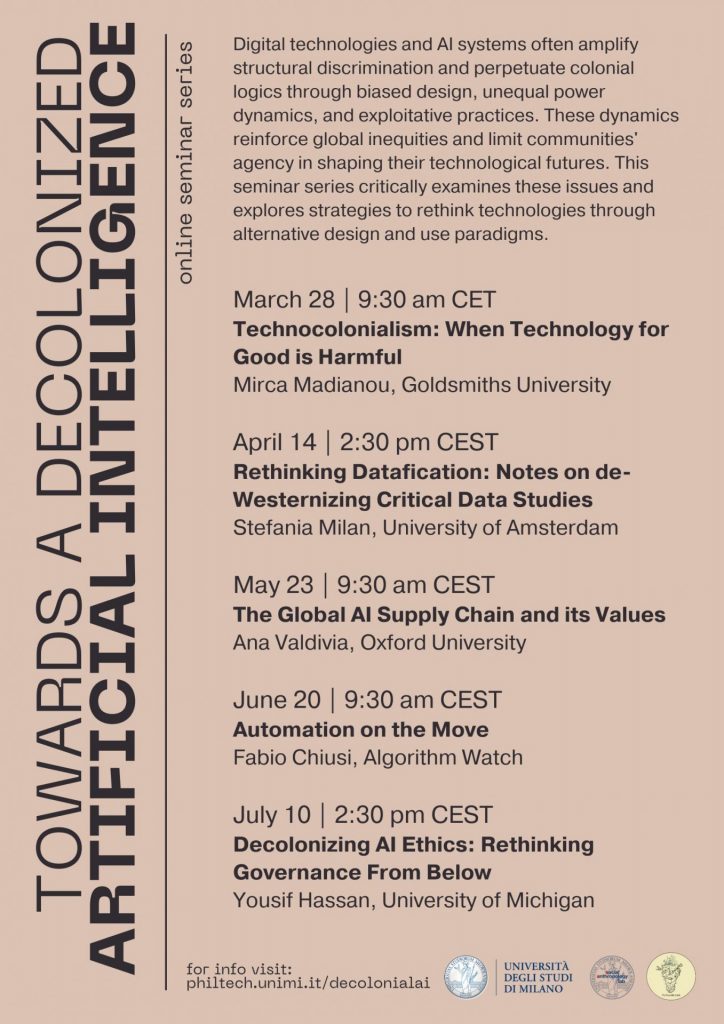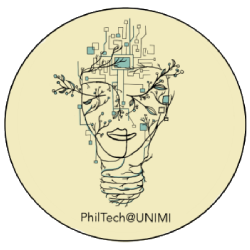Organized by Diletta Huyskes, Maria Sapignoli, Giuseppe Primiero
Digital technologies and AI systems often amplify structural discrimination and perpetuate colonial logics through biased data, unequal power dynamics, and exploitative practices. These dynamics reinforce global inequities and limit communities’ agency in shaping their technological futures. This online seminar series critically examines these issues and explores strategies to rethink technologies through alternative design and use paradigms.
To receive the Teams links needed to follow the seminars online, it is necessary to register for each individual meeting on Eventbrite: https://www.eventbrite.com/cc/towards-a-decolonized-ai-online-seminar-series-4083273?utm-campaign=social&utm-content=creatorshare&utm-medium=discovery&utm-term=odclsxcollection&utm-source=cp&aff=escb

PROGRAMME
SPEAKER: Mirca Madianou, Goldsmiths, University of London
TITLE: Technocolonialism: When Technology for Good is Harmful (book presentation)
March 28, 9:30-10:30 CET
With over 300 million people in need of humanitarian assistance and with emergencies and climate disasters becoming ever more common, artificial intelligence (AI) and big data are being championed as a force for good and as a solution to the complex challenges of the aid sector. Madianou’s book argues, on the contrary, that digital innovation, data and AI practices entrench power asymmetries and engender new inequities between the global south and north. Madianou develops a new concept, technocolonialism, to capture how the convergence of digital developments with humanitarian structures, state power and market forces reinvigorates and reshapes colonial legacies. The concept of technocolonialism shifts the attention to the constitutive role that digital infrastructures, data and AI play in accentuating inequities between aid providers and people in need and, ultimately, rich and poor countries.
SPEAKER: Stefania Milan, University of Amsterdam
TITLE: Rethinking Datafication: Notes on de-Westernizing Critical Data Studies
April 14, 14:30-15:30 CEST
Stefania Milan (stefaniamilan.net) works at the intersection of political participation, digital technology, and governance, with emphasis on infrastructure, citizen agency, and resistance. In the last years, she took part in the Big Data from the South Initiative (BigDataSur) which has addressed the urgent need to de-Westernize critical data studies and reimagine datafication through the perspectives of the Souths. Drawing from Latin American decolonial scholarship, BigDataSur has provided a space to interrogate the epistemological, ontological, and ethical dimensions of datafication beyond universalistic interpretations, acknowledging the South as a plural and dynamic space of knowledge production. Highlighting how Latin American thinkers – such as Martín-Barbero, Freire, Mignolo, Rodríguez, and Escobar – offer crucial insights for decolonizing the datafied society, such as the importance of agency, alternative imaginaries, and the necessity of transforming not only data practices but also knowledge production itself, this seminar will challenge dominant narratives in data studies and calls for an ethics of reparation that recognizes diverse ways of knowing and engaging with data.
SPEAKER: Ana Valdivia, Oxford University
TITLE: The Global AI Supply Chain and its Values
May 23, 9:30-10:30 CEST
Automated systems do not just impact an individual or population groups directly. Valdivia calls for rethinking how we define algorithmic harms and the impact of AI by assessing the exploitative practices embedded within the supply chains that bring specific systems to life. This infrastructure includes the systems’ data centers, component mining and e-waste dumps to deposit cables, batteries, pipes or processors, for instance. In short, everything that has significant consequences for the territories and local communities affected by the production of such systems. In this vein, Valdivia spent three months in Mexico to understand how daily operations at ten data centers are depriving the rural community of Maconí of water in Querétaro, one of the most developed states. Her fieldwork revealed that Maconí people are forced to walk eight hours to get water for cooking and washing, while the local government signs agreements worth millions of dollars with hydraulic companies to secure water access for large investors like Amazon or Microsoft that plan to build even more data centers.
SPEAKER: Fabio Chiusi, AlgorithmWatch
TITLE: Automation on the Move
June 20, 9:30-10:30 CEST
Systems based on Artificial Intelligence (AI) and automated decision-making (ADM) are increasingly being experimented with and used on migrants, refugees, and travelers. Too often, this is done without adequate democratic discussion or oversight. In addition, their use lacks transparency and justification to those who are subjected to these systems, as a growing body of literature and evidence shows. Adopting a mixture of investigative journalism, desk research, in-depth analysis of the available literature and use cases, and network building, this project aimed to challenge the structural opacity that guides technologies in this context, with a specific focus on understanding the actual outputs and vision behinds EU-funded research and innovation projects involving automated technologies in migration.
SPEAKER: Yousif Hassan, University of Michigan
TITLE: Decolonizing AI Ethics: Rethinking Governance From Below
July 10 | 2:30 pm CEST
Artificial Intelligence (AI) is capturing the African imaginations as a gateway to progress and prosperity. Several actors in the continent including governments, scientists, entrepreneurs, and international development organizations are turning to AI to address long-standing socioeconomic challenges in the continent. On the other hand, African researchers highlight the gap in regulatory frameworks and policies that govern the development of AI in Africa. They argue that AI technology could exacerbate problems of inequalities and injustice in the continent. However, most of the literature on AI ethics is biased toward Euro-American perspectives and based on Western frameworks and epistemologies. They lack the understanding of how AI development is apprehended in the Global South, and particularly Africa. Drawing on case studies in the area of AI for development in the continent, this talk argues for looking beyond the question of ethics in AI and examining AI governance issues through the analytical lens of coloniality and the political economy of technoscience to understand AI development in Africa. By doing so, this talk presents a different theorization for AI ethics from the South that is based on lived experiences of those in the margins and avoids the framing of technological futures that simplistically pathologize or celebrate Africa.
